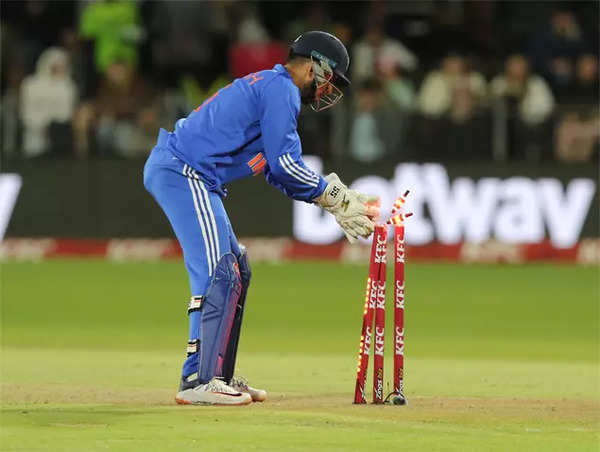NEW DELHI: Wicketkeeper-batter
Jitesh Sharma
is one of the new members of the Indian cricket team, making his international debut in this year's
Asian Games
in Hangzhou. Team India returned home with a gold medal from the continental sporting extravaganza in October.
Following the Asian Games, Jitesh got the opportunity to showcase his skills in the five-match home T20I series against Australia in December.
He got to play the final two games in the series, which the hosts India won 4-1.
Jitesh demonstrated his aggressive batting style by scoring a rapid 35 off 19 balls, a strike rate of 184.21, in the fourth T20I. He followed that up with another quick knock of 24 in 16 balls, a strike rate of 150.
However, the recent South Africa tour posed challenges for Jitesh as he managed just five runs in two innings. Despite the recent setbacks, Jitesh will be vying for the crucial role of wicketkeeper-batter and finisher in the Indian squad for next year's
T20 World Cup
.

(Photo by Richard Huggard/Gallo Images/Getty Images)
In an exclusive interview with TimesofIndia.com, Jitesh shared his experience with Team India, advantages of being a wicketkeeper and the role of lower-order batter in the team. Excerpts:
How do you balance the responsibilities of keeping wickets and contributing with the bat, especially in pressure situations?
I think it's very easy when you try to be in the present. While keeping if you focus on keeping so it will be easy, and while batting you focus on batting. So being in the present always makes things easy for me. I think staying in the moment makes everything easy.
The finisher role is crucial in limited overs cricket. How do you approach your innings when the team relies on you to finish strongly?
I think everyone knows that batting at number five and six have a huge responsibility. Everyone knows that it comes with higher risk. And I understand my role.
I understand the team's demands for winning, but I can just assess the situation and according to the situation I can play. I can give my 100% or try to maximize on every loose ball and try to win the game. That's always been my thought process.
How do you use your insights from behind the stumps to your advantage both in terms of batting and supporting the bowlers?
I think it's all about instinct. I have been playing so much cricket in the domestic, IPL and everything, so I think whatever your heart says, your instinct says, you should do it. As a wicketkeeper, you should share insights with your bowlers because you are someone who's seeing the ball very closely behind the stumps. So I don't hesitate to give any advice to the captain or any bowler because I know my little bit of input can benefit my team. So that's the thing I go with my instinct. I feel whatever I see on the wicket, what's happening I tell the captain and bowlers.
What do you think is the key to being a successful finisher in modern-day cricket?
I think trying to be neutral during the situation because there is no guarantee that you will be successful on number six or number five because it's a very high risk percentage game batting at that position. So be neutral, try to watch the ball as close as possible and be calm in the situation. And self-belief is the key to play a finisher role.
What are the key attributes that a finisher should possess not just in terms of skill, but also in terms of mindset and temperament?
I think, first of all for a finisher, he should know his strength, where he is strong. That's the most important. If the batsman knows the strength, he can work on it. Having your belief on that strength is the main key for the success of scoring runs in the lower order batting.
How do you approach learning from experienced players and absorbing the wealth of knowledge they bring to the table?
I think everyone has the knowledge and when you play for the country you always feel that there is something you have to learn. Whenever I play with my seniors, it feels like I have so much to learn. I think playing sports is a learning process only. Till you retire, after you retire also you have to keep learning because the game evolves. So I think it's a process of always learning from seniors.
Can you share a piece of advice you have received that has had a significant impact on your approach to the game?
Everyone has spoken with me and they always say the simple thing - "believe in your game", we will back you, that's the thing. There is a lot of advice but I think their motto was believe in yourself, believe in your game and be natural, be expressive whatever the situation is. Irrespective of the situation, play your game.
BCCI retires MS Dhoni’s Iconic Jersey No 7 to honour his contribution to Indian cricket
With the addition of Harshal Patel and Chris Woakes, what do you think the team dynamics are going to be at Punjab Kings?
I think we got Harshal Patel, an Indian fast bowler. It will be a big support for
Arshdeep Singh
. His workload will get less because he is someone who always bowled the difficult overs for the Punjab Kings. Now, Harshal has that experience that they can share in those difficult overs. They can share their insights. So that's a very big advantage that Harshal is in our team. Woakes is someone who has vast experience and he knows how to soak the pressure. So for us, having someone who is very quick will be helpful for the team in Mohali wickets.









 English (US) ·
English (US) ·